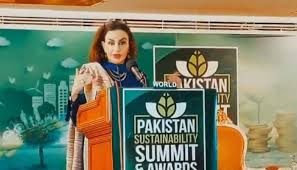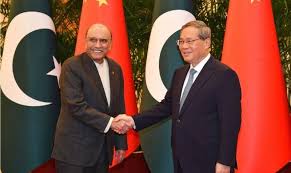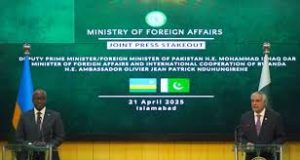Senator Sherry Rehman addresses Pakistan sustainability summit

Liaquat Ali
Islamabad: At the Pakistan Sustainability Summit, Senator Sherry Rehman stressed the urgent need for moving beyond policy declarations to practical, real-world actions to tackle environmental and sustainability challenges.
She highlighted the importance of coordination between provincial and federal levels to achieve sustainability goals.
Rehman emphasized that budget planning should incorporate environmental stability and sustainability objectives, ensuring that they become central to policy-making. She also called for Pakistan to maintain a strong presence and influence in international climate negotiations, as staying active in key global forums will allow the country to shape international environmental policies.
The senator pointed out that Pakistan must stay updated with rapidly evolving global climate projects and technological advancements. She noted that water and food security are major concerns in the country’s sustainability dialogue and need to be prioritized in policy discussions.
Rehman argued that sustainability efforts should not be limited to rhetoric but must connect with on-ground realities. She called for the integration of circular economy practices and waste management into the national sustainability agenda. The senator also underscored the role of individuals, alongside the government and civil society, in contributing to sustainability efforts.
Drawing attention to the alarming air quality in Lahore, which she described as the most polluted city in the world, Rehman advocated for the immediate implementation of a National Clean Air Policy to tackle local pollution. She warned that Pakistan is already facing an environmental crisis, and urgent action is needed to avoid falling further into a cycle of disasters.
The effective allocation of resources is critical, she said, as global greenhouse gas emissions continue to rise despite decades of climate conferences. Rehman called for urgent measures to achieve the 1.5-degree Celsius target set by the Paris Agreement, noting that without prompt action, this goal will be out of reach.
She also highlighted the importance of proper waste management to prevent toxic pollution in Pakistan’s rivers and water bodies. With only 9% of the world’s plastic being recycled, the senator stressed the severity of the waste problem and urged a focus on improving the country’s waste management systems. She pointed out the lack of recycling collection points or dumping sites in Pakistan and acknowledged that the nation’s recycling rate is significantly lower than that of other countries.
Rehman concluded by calling for self-accountability regarding climate change efforts in Pakistan, emphasizing that meaningful progress requires a collective commitment to addressing environmental issues head-on.





